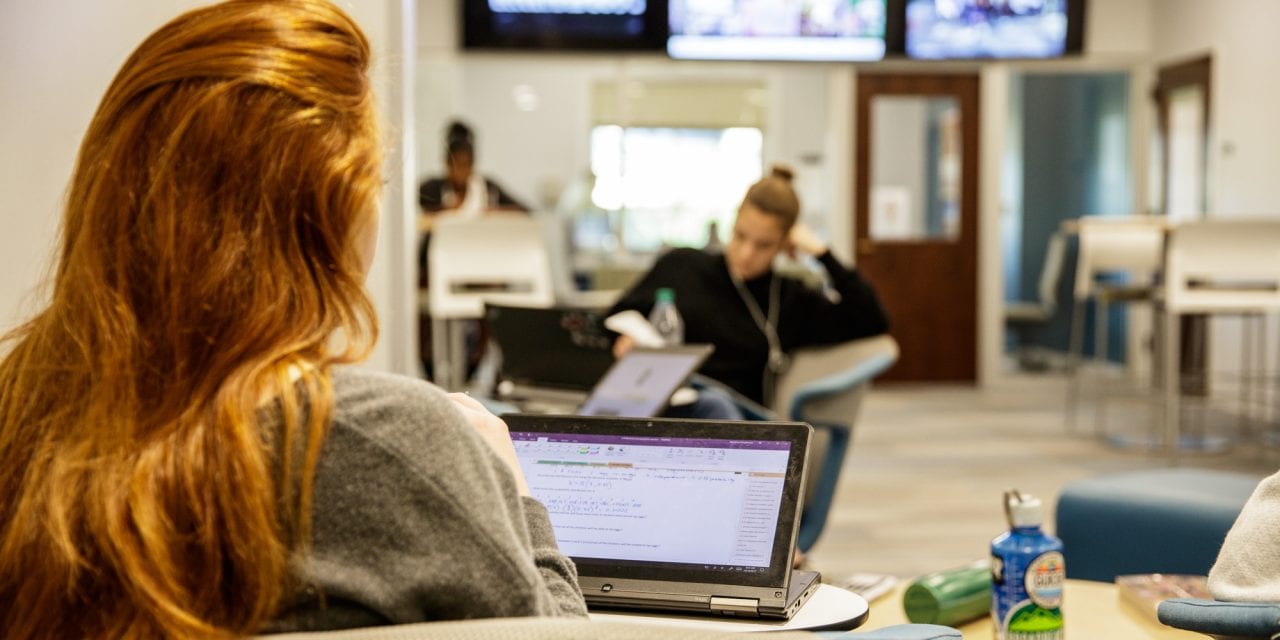On Monday of this week, I broke an unwritten rule of the Upper School: I traipsed upstairs, and rather than follow the well-trod path toward the teacher lounge and the coffee machine, I turned right, threaded my way between the book bags, and plopped myself onto a couch in the Senior Corner.
The seniors politely tried to ignore me. An adult—an administrator, no less—had intruded into their sanctum sanctorum, their happy land overseen by cheerful painted mountains and the cardboard cut-out of Bob Ross.
I cleared my throat and said, “I’m writing a blog, and I would like your thoughts. Would you mind?”
They paused, and after a brief moment of internal debate, they all declared, “Of course not.” Even if I was an intruder, they would be polite.
“As you think about the classes that you’ve taken at CA,” I asked, pen in hand, “what jumps out at you?”
“10th grade English,” one student stated almost immediately. “That was the first time that we had to analyze the literature really deeply and write a long essay about it. That was such an important learning experience.”
Other students added their thoughts.
“Turbo-Calc. It was flexible. It was my first blended class, and I chose whether to do the homework—if I didn’t need the practice, I didn’t have to do it. But it was my choice.”
“Advanced Chemistry. It was practical. I started to see how it related to every day. We talked about the forces that held my water in my water bottle. And I learned why my car works better in the morning in the summer than in the winter.”
“Advanced Biology. I learned about myself. There was no place to hide in the class, so I had to be on top of the material.”
“Advanced Environmental Science. I loved the homework, just because it was so different. Sometimes it was a blog post. Sometimes, a tweet. But we had so many different activities.”
The next period, after lunch, I ambushed three more unsuspecting seniors in the Collabo-lounge. I repeated my story—blog, student thoughts, help—and then asked them, “Looking back, what classes or experiences stand out to you, and why?”
They also answered, almost before I had finished asking the question.
“The exchange trips were transformative. We were immersed in a culture, and we had to speak the language—there was no other choice.”
“When I was on the exchange trip, it was the first time I thought in a different language. I was starting to write a text to my mom, and then I realized, ‘wait, I should write this in English.’”
“Critical thinking—that’s what I’ve gotten from my CA classes. We apply it to our learning and the work that we create.”
“I love the change in the schedule—it’s allowed me to pursue an internship in art during my long block!”
Another student added, “I actually don’t like the change in schedule. But you’re not going to put that in the blog, are you?”
***
Several years ago, members of Cary Academy’s Strategic Planning Committee reinvigorated our mission by crafting a guiding statement: “Cary Academy will create learning opportunities that are flexible, personalized, and relevant. We will cultivate self-directed and bold life-long learners who make meaningful contributions to the world.”
That statement has guided the changes to the Upper School schedule, which allowed us to provide more flexibility in several departments. We opened the science curriculum, offering more choice for all students. We also expanded the times for art classes, allowing students to take multiple arts classes in a day.
That statement has guided the development of the Center for Math and Science, which will allow us to engage our students in deeper collaborative experiences.
Courtesy of the space provided by the CSM, that statement will guide us as we re-envision the Upper School building to match the needs of our students taking their humanities classes.
And that statement, in small and large ways, has filtered into the experiences and language of the students. I did not share this statement with any of the students, yet—unbidden—they all referenced some aspect of the goal in their responses, much to my joy.
***
On Tuesday of this week, I had the chance to listen to two different student panels: one answered questions of prospective parents, the other spoke to underclassmen. Both of those groups of students emphasized the idea of curiosity, even if they didn’t use that word. They spoke of the joy when discovering a passion, of the need to focus on the personal journey, of the gift of flexibility.
In other conversations with students over the past few weeks, I have heard the joy derived from classes across all departments and grade levels.
So as a community, we have revised our schedule and rebuilt our buildings in order to facilitate that curiosity—and the students have embraced all of those opportunities.
And we will do more, nurturing that curiosity by creating additional opportunities for students to develop their paths, delving into the experiences that hold meaning and relevancy for them, and—ultimately–for the world outside of Cary Academy.
Even if not all the students are completely in favor of the schedule changes.
P.S. Thanks again to the seniors who willingly put up with my questions during their free periods.

